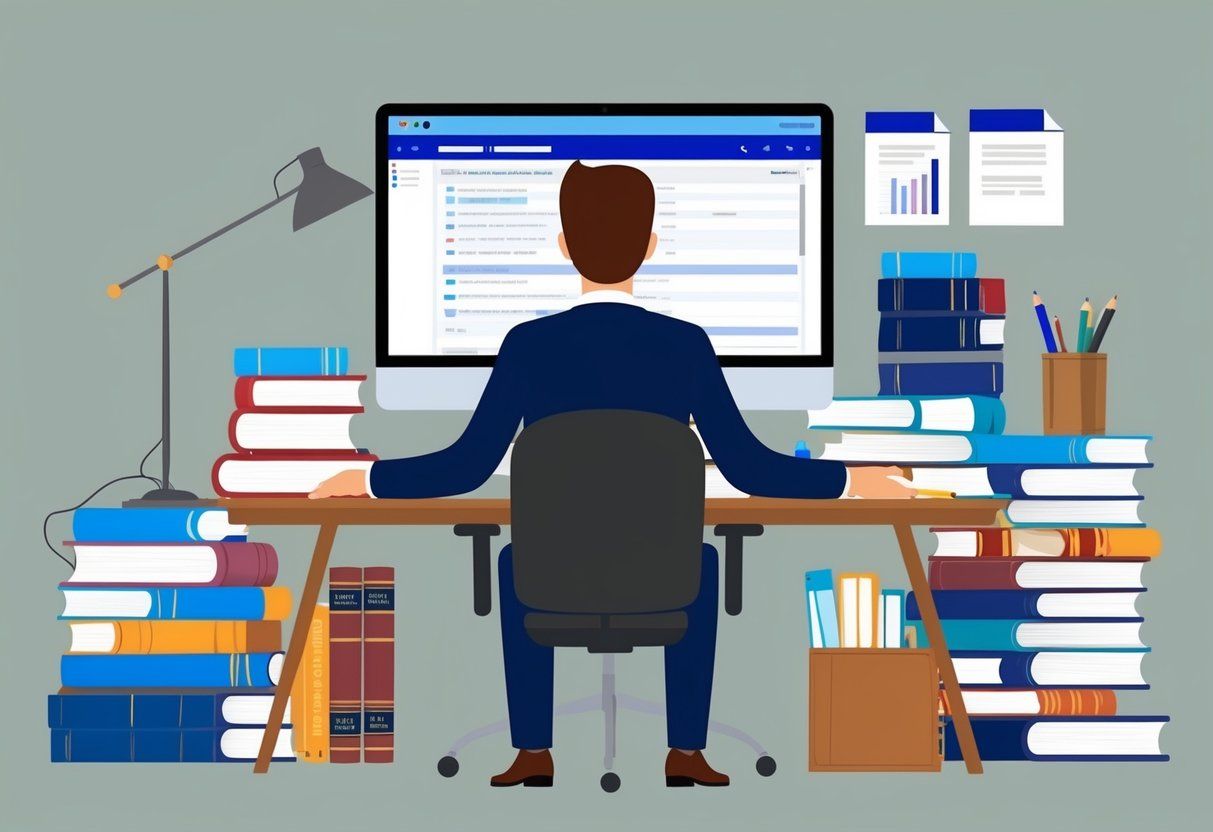Legal Research Tools: Essential Software for Modern Lawyers
By Eric Do Couto
Updated April 7, 2025

Legal Research Tools: Essential Software for Modern Lawyers
Legal research tools, used by law firms to conduct legal and regulatory research, are essential for attorneys, paralegals, and legal professionals to efficiently find and analyze relevant information. These tools provide access to case law, statutes, regulations, and legal commentary, enabling teams to stay current with legal developments, and build strong arguments.

Modern legal research tools now leverage artificial intelligence (AI) and machine learning to make the lives of attorneys and knowledge management teams even easier -- from enhancing search capabilities, analyzing updates for importance, improving accuracy, and reducing research time. AI-powered platforms can quickly sift through vast databases, identify relevant precedents, and suggest related cases or statutes that human researchers might overlook.
Legal professionals can now access a wide array of research options, from traditional powerhouses like Westlaw and LexisNexis, catering to bigger budgets, to innovative newcomers that focus on specific practice areas or jurisdictions.
Some tools, like Visualping, can track any web sources on the internet, and send teams the precise legal and regulatory alerts they need.
Understanding Legal Research

Legal research forms the backbone of effective legal practice. It involves systematically investigating relevant authorities, interpreting laws, and building compelling arguments. This skill is crucial for lawyers, paralegals, and legal scholars alike.
Fundamentals of Legal Research
Legal research begins with identifying the legal issue at hand. This process requires analyzing facts, formulating questions, and determining applicable jurisdictions. Researchers then locate primary sources such as statutes, regulations, and case law.
Secondary sources, such as legal encyclopedias and law review articles, provide context and analysis. These resources help researchers understand complex legal concepts and find relevant primary authorities.
Effective legal research also involves proper citation of sources. This ensures that arguments are credible and allows others to verify information. Researchers must stay updated on changes in laws and precedents to provide accurate advice.
Types of Legal Resources
Legal resources fall into several categories:
- Primary sources: Constitutions, statutes, regulations, and court decisions, which carry the force of law and are essential for understanding legal obligations.
- Secondary sources include commentary and analysis, such as law reviews, treatises, and legal dictionaries, which help interpret primary sources and provide historical context.
- Online databases like LexisNexis and Westlaw offer comprehensive collections and advanced search capabilities.
- Public records, such as property deeds and business filings, provide crucial evidence in various legal matters.
Role of AI in Legal Research
Artificial intelligence is revolutionizing legal research. AI legal research tools can analyze vast amounts of legal data in seconds, identifying relevant cases and statutes with unprecedented speed and accuracy.
Natural language processing allows researchers to ask complex questions in plain English, and predictive analytics help lawyers assess the likelihood of success in litigation. Machine learning also assists in contract analysis and due diligence, reviewing thousands of documents and flagging potential issues for human review.
Key Legal Research Tools

Legal professionals rely on a variety of powerful tools to conduct efficient and comprehensive legal research. These platforms offer extensive case law databases, statutes, regulations, and analytical features to support legal work.
Visualping
Visualping is a legislative tracking software that can send legal and regulatory alerts from any web sources online. This includes official government channels, such as the CFR or Federal Register, and also more granular government sub-sites, that publish changes otherwise unavailable on research databases, like WestLaw, and LexisNexis.
Such updates can include agency forms and documents, debate, hearings, meeting schedules, newly amended regulations, and more.
You can also monitor updates to government websites, court dockets, or industry-specific regulatory pages. Legal professionals can use Visualping alongside other legal research tools to create a more efficient and thorough research process.
Visualping allows users to track specific web pages and receive alerts when changes occur. This tool can be handy for monitoring state and federal legislation updates, ensuring legal teams have the most current information at their fingertips.
By automating the process of checking for updates, Visualping helps legal professionals save time and focus on analyzing the implications of new legal developments.
LexisNexis and Lexis+
LexisNexis stands as a cornerstone of legal research, providing access to an extensive collection of primary and secondary legal sources.
Lexis+ enhances the traditional LexisNexis experience with a more intuitive interface and improved search capabilities. It integrates legal research, practical guidance, and analytics in one seamless platform.
These tools allow users to quickly find relevant cases, statutes, and regulations across jurisdictions. They also provide access to law reviews, treatises, and practice guides to support comprehensive legal analysis.
Westlaw and Bloomberg Law
Westlaw, a product of Thomson Reuters, is renowned for its comprehensive legal research capabilities. It offers a vast database of case law, statutes, and secondary sources, complemented by proprietary headnotes and key number system.
Bloomberg Law combines legal research tools with business intelligence. It provides access to court dockets, company information, and news alongside traditional legal resources.
Both platforms feature powerful search algorithms and citator services to help users find and validate legal authorities. They also offer practice-specific content and tools to support various legal specialties.
Google Scholar and Free Legal Research Tools
Google Scholar provides free access to a wide range of legal opinions and academic articles. Its user-friendly interface and powerful search capabilities make it a valuable resource for initial research.
Other free tools include Fastcase, which offers a comprehensive law library, and Casetext, known for its innovative CARA AI technology. These platforms provide cost-effective alternatives for legal professionals and the public.
Justia and FindLaw also offer free access to legal information, including case law, statutes, and legal articles. These resources are particularly useful for preliminary research and staying updated on legal developments.
Professional Networks and Legal Databases
Professional networks like LinkedIn and specialized legal forums provide opportunities for lawyers to connect, share knowledge, and stay informed about industry trends.
Legal databases such as HeinOnline and JSTOR offer access to historical legal documents, scholarly articles, and specialized collections. These resources are invaluable for in-depth academic research and analysis.
Many bar associations and law schools maintain their own databases, providing members with access to jurisdiction-specific resources and practice guides. These tools often complement commercial legal research platforms.
Exploring Case Law and Jurisprudence

Case law and jurisprudence form the backbone of legal research. Understanding court decisions at various levels is crucial for legal professionals to build strong arguments and provide accurate advice.
Addressing Supreme Court Decisions
Supreme Court decisions hold immense weight in the legal system. These rulings set precedents that lower courts must follow. Lawyers and researchers can access Supreme Court opinions through various legal research tools.
Key databases provide comprehensive collections of Supreme Court decisions, often including summaries and analysis. These resources allow legal professionals to track the evolution of legal interpretations over time.
Researchers should pay close attention to majority opinions, dissents, and concurrences. These different perspectives can offer valuable insights into complex legal issues and potential future developments in the law.
Navigating Federal and State Courts
Federal and state court decisions play distinct roles in the legal landscape. Federal court rulings apply nationwide for federal law matters, while state court decisions interpret state laws and constitutions.
Researchers must be aware of the hierarchical structure of courts when examining case law. District court decisions may be overturned by appellate courts, making it essential to find the most recent and authoritative rulings.
Many legal research platforms offer filters to narrow searches by jurisdiction, court level, and date. This functionality helps users quickly locate relevant cases and track how legal interpretations may differ across jurisdictions.
Utilizing Court Decisions and Case Summaries
Effective use of court decisions and case summaries is vital for thorough legal research. Case summaries provide quick overviews of key facts, legal issues, and holdings, saving time during initial research phases.
Full court opinions offer detailed legal reasoning and analysis. Researchers should examine these closely to understand the court's logic and identify potential arguments for their own cases.
Legal research databases often include citators, which show how subsequent cases have treated a particular decision. This information helps determine if a case remains good law or has been overturned or limited in scope.
Researchers can also use case summaries and decisions to identify relevant statutory law and secondary sources, creating a comprehensive picture of the legal landscape surrounding their issue.
Utilizing Court Documents and Legal Procedures

Legal research tools provide essential resources for navigating court documents and procedures. These tools streamline the process of finding relevant information and managing legal documents effectively.
Finding and Applying Court Rules
Legal research platforms may also offer access to court rules for federal, state, and local jurisdictions. Attorneys can quickly locate specific rules governing filing deadlines, document formatting, and courtroom procedures.
Tools like Visualping can enable users to set alerts for rule changes, ensuring compliance with the latest requirements. Some platforms provide annotated versions of court rules, offering insights into their application in previous cases.
Practitioners can use these tools to compare rules across jurisdictions, which is particularly valuable for attorneys handling cases in multiple courts. This feature helps legal professionals avoid procedural missteps that could negatively impact their cases.
Managing Legal Documents Efficiently
Effective document management is crucial for legal research and case preparation. Modern legal research tools often include features for organizing, storing, and retrieving legal documents.
These systems allow users to:
- Tag documents with relevant metadata
- Create customized folders for different cases or topics
- Perform full-text searches across document libraries
- Collaborate with team members on document review and editing
- Advanced platforms integrate with case management software, enabling seamless workflow from research to document creation. This integration helps legal professionals maintain version control and track document history.
Some tools offer AI-powered document analysis, which can identify key concepts, extract relevant information, and suggest related documents. This technology significantly reduces the time spent on manual document review and enhances the thoroughness of legal research.
Leveraging Technology in Law Practice

Modern legal practices are increasingly relying on advanced technological solutions to streamline operations and enhance client service. These tools integrate seamlessly with existing systems, boost productivity, and provide data-driven insights for strategic decision-making.
Integration with Practice Management
Legal professionals now utilize comprehensive practice management systems that combine various aspects of law firm operations. These platforms often include document storage, case management, and client communication features.
Case management software organizes client information, deadlines, and documents in a centralized location. This integration allows attorneys to access critical data quickly and efficiently.
Document storage systems employ advanced encryption and backup protocols to ensure client confidentiality and data security. These systems often include version control and collaboration tools, facilitating teamwork among legal professionals.
Productivity and Time Tracking Software
Law firms are adopting specialized productivity and time-tracking tools to optimize billable hours and improve workflow efficiency. These applications often integrate with practice management software for seamless data flow.
Time tracking software allows lawyers to record billable hours accurately, even remotely or on mobile devices. Some tools use AI to suggest time entries based on calendar events or computer activity.
Productivity apps help legal professionals manage tasks, set reminders, and prioritize workloads. Many of these tools offer team collaboration features, enabling better coordination on complex cases.
Litigation Analytics and Data-Driven Insights
AI-powered litigation analytics tools are revolutionizing case strategy and outcome prediction. These systems analyze vast amounts of historical case data to provide valuable insights.
Attorneys can use these tools to assess the likelihood of success in different jurisdictions or before specific judges. This data helps in making informed decisions about settlement offers or litigation strategies.
Data-driven insights extend to legal research, with AI algorithms quickly identifying relevant precedents and statutes. This technology significantly reduces research time and improves the accuracy of legal arguments.
Accessing and Leveraging Secondary Legal Materials

Secondary legal materials provide invaluable context and analysis to support legal research. These resources offer insights from experts and help identify relevant primary sources for comprehensive case preparation.
Legal Encyclopedias and Law Review Articles
Legal encyclopedias serve as essential starting points for legal research. They offer broad overviews of legal topics, explaining key concepts and citing relevant cases. Researchers can quickly grasp fundamental principles and locate pertinent primary sources.
Law review articles provide in-depth analysis of specific legal issues. These scholarly works often explore emerging trends, critique existing laws, and propose new legal theories. They are particularly useful for:
- Understanding complex legal concepts
- Identifying authoritative cases and statutes
- Gaining insights into evolving areas of law
Many digital platforms now offer searchable databases of law review articles, making it easier to find relevant scholarship on specific topics.
Citation Services and Case Law Research Tools
Citation services streamline the process of tracking case histories and verifying the current status of legal authorities. These tools allow researchers to:
- Check if a case has been overturned or criticized
- Find related cases that cite a specific decision
- Locate secondary sources that discuss a particular case
Case law research tools provide efficient access to vast databases of judicial opinions. Advanced search features enable users to filter results by jurisdiction, date range, and keyword relevance. Many platforms also offer:
- Headnotes summarizing key points of law
- Visual representations of case relationships
- Alerts for new decisions in specific areas of interest
These tools significantly enhance the speed and accuracy of legal research, allowing practitioners to build stronger arguments and provide more informed counsel to clients.
Advanced Topics in Legal Research
Legal research expands beyond basic case law and statutes to encompass specialized areas and ethical considerations. Advanced techniques and resources enable researchers to navigate complex legal landscapes effectively.
Specialized Areas of Law
Specialized practice areas require targeted research approaches. Tax law research often involves analyzing IRS regulations and tax court decisions. Bankruptcy research focuses on federal codes and local court rules.
Health law researchers must stay current on rapidly evolving regulations and policies. Patent law demands thorough searches of prior art and USPTO guidelines. Securities law research involves SEC filings and regulatory updates.
Practical guidance tools offer practice-specific resources, forms, and checklists. These tools help attorneys quickly find relevant information for their specialized fields.
Ethical Considerations and Due Diligence
Ethical research practices are crucial in the legal profession. Attorneys must ensure the accuracy and currency of their research to provide competent representation.
Due diligence in legal research involves thorough investigation of all relevant sources. This includes checking for recent changes in law or overturned precedents. Researchers should verify information from multiple reputable sources.
Professional Development and Continuing Education
Legal professionals can enhance their skills and stay current through various resources and associations. These opportunities provide valuable knowledge and networking prospects for both established firms and solo practitioners.
Resources for Law Firms and Solo Practitioners
Platforms like Quimbee offer CLE courses in legal research and writing. These programs deliver engaging content through video formats, making learning both informative and enjoyable.
For those seeking advanced skills, certificate programs in legal research are available. These courses often include access to professional legal research databases like Westlaw.
Involvement with Legal Associations
The American Bar Association provides numerous professional development opportunities. It offers conferences, webinars, and publications that cover a wide range of legal topics and precedents.
Collaborations with universities through platforms like Coursera allow legal professionals to access high-quality education from reputable institutions. These partnerships offer courses on current legal trends and specialized areas of law.
Local bar associations often organize events and workshops. These gatherings facilitate networking and the exchange of ideas among legal professionals, contributing to their ongoing development and knowledge of legal analysis techniques.
Legal professionals can use these powerful research tools to enhance their understanding, stay informed, and succeed in their practice.
Want to know when a web page changes?
Visualping is a simple tool that helps over 2 million users effortlessly detect important changes on any web page.
Eric Do Couto
Eric is the Senior Partnerships Manager at Visualping. Eric has over 10+ years of experience in Marketing and Growth Leadership roles across various industries.
